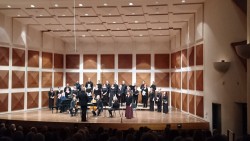In November’s Choralscene I previewed the Grand Philharmonic Chamber Singers' performance of James Whitbourn’s Annelies, a setting of the Diary of Anne Frank. I stopped by Waterloo to catch the performance. Under the artistic direction of Mark Vuorinen, each time I’ve seen the choir in action I find them warm, balanced and talented. Soprano Natasha Campbell provided a strong and proficient solo voice for the evening.
There is nothing musically wrong with the GPCS performance of Annelies. I enjoyed their interpretation and performance. However, I find the work lacklustre and confusing. I understand using text and stories to inform choral writing. I understand that there are deliberate choices that help shape and define what a composer chooses for instrumentation and compositional tools. I just can’t actually figure out or explain the choices that James Whitbourn has made. Repetition is a core theme, both in the text and in instrumental motifs, and Vuorinen is insightful and manages to make these different and fresh every time with the ensemble. This is not an easy feat and the choir provided a superior interpretation of what the work intends to convey.
But the story falls flat because Whitbourn either forgot or chose to ignore one key thing – that Anne Frank was a child. The Diary of Anne Frank is a collection of deeply personal and remarkable thoughts from a child enduring inhumane conditions. This is my discomfort with the piece: it is devoid of references to childhood and child performers. The only overt attempt at bringing this in with the “Military marching dance” section in the middle of Number 5 Life in Hiding just came across as odd. I believe Whitbourn managed to compose this entire work about and for Anne Frank and forgot her childhood in the process.
This disconnect continues in a few other parts of note. For one, the use of a Kyrie Sinfonia was odd because Anne Frank was Jewish, not Christian. And towards the end as the diary entries end and the choir takes on a narrative tone, it is done in plainchant – again, invoking a distinctly Christian compositional tool. In the middle of the work, Whitbourn chose to set two German traditional songs. This section was the messiest by the choir and it is unfortunate because their German diction was on point.
In works like this, a strong director is a key point of reference. My conversation with Vuorinen last month showed an understanding of the work, despite its flaws. Vuorinen’s addition of Srul Irving Glick’s Radiant is the World Soul (part of the larger Triumph of the Spirit collection) to the program showed thoughtfulness, and this fit into the overall presentation of the evening very neatly. It provided a superior addition to the lacklustre finish of Annelies.
Throughout this performance, I kept thinking about the profound impact of war and conflict on the lives of children. I think of our contemporary conflicts, of which there are plenty: the hate-filled warful Daesh, the Syrian civil war, the state-sponsored eradication of the Rohingya, the US-Mexican border drug wars, and too many others to name. There is an Anne Frank somewhere in those conflicts, hiding, terrified, and awaiting death. This is my takeaway message from this performance – stories like this should never have to be told. Sadly, this isn’t the world we live in. We have far too many stories like these to tell. And there is no end in sight.
James Whitbourn's Annelies was performed at Maureen Forrester Hall, Wilfrid Laurier University on November 19, by the Grand Philharmonic Chamber Singers under Mark Vuorinen.
Follow Brian Chang on Twitter @bfchang. Send info/media/tips to choralscene@thewholenote.com.



